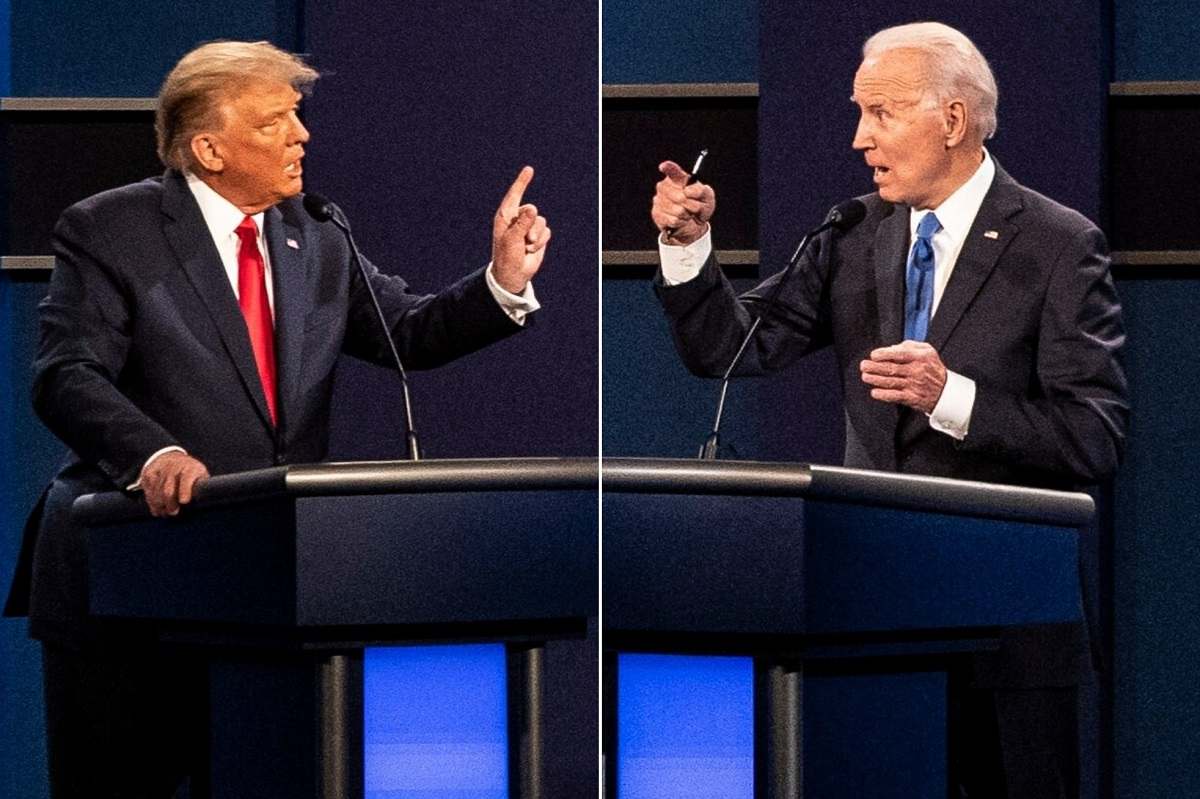
President Donald Trump and Joe Biden debate in November 2020 in Nashville in this composite image.
16:42 JST, May 16, 2024
President Biden and former president Donald Trump agreed Wednesday to a June 27 debate on CNN and a Sept. 10 debate broadcast by ABC News, bypassing the decades-old tradition of three fall meetings organized by the bipartisan Commission on Presidential Debates.
The decisions by the major party candidates to take control of the once independent debate planning process upended the timeline that has defined presidential contests for decades, adding unpredictability to an already close race. The two debates will happen much earlier than normal, which could awaken voters who have not yet tuned into the election.
Both candidates would be taking a chance by debating. If he stumbles or appears forgetful, Biden, 81, risks confirming some Americans’ suspicions that he’s too old for the job. But Trump, just 4 years younger, has also faced doubts about his age. A face-to-face meeting could also remind Americans of Trump’s volatility and would give Biden the chance to describe the election as a choice between the two men, rather than a referendum on his record.
“Because of these questions about his capacities, Biden has a lot at stake,” said David Axelrod, former senior adviser to President Barack Obama. “But Trump has a lot at stake here too, because if Biden does pierce that narrative, it could change the dynamic of the race.”
The terms of the first debate remained a work in progress late Wednesday. The CNN debate in Atlanta, moderated by anchors Jake Tapper and Dana Bash, will be conducted without a live audience. It will be open to any presidential candidate who gets 15 percent in four separate approved national polls between March 15 and June 20; who gets on enough ballots to have a path to winning a majority of the votes in the electoral college; and who agrees to the debate rules. ABC News did not immediately release its qualification requirements.
CNN’s rules open a possible path for independent candidate Robert F. Kennedy Jr. to make the stage. But Biden advisers said they had told CNN that the president would only participate in debates that were one-on-one with Trump, and they did not agree to another debate Trump suggested, on Fox News in October.
“President Biden made his terms clear for two one-on-one debates, and Donald Trump accepted those terms,” campaign chair Jen O’Malley Dillon said in an afternoon statement. “No more games. No more chaos, no more debate about debates.”
A Trump campaign official said a CNN producer had given assurances in a call Wednesday morning that “RFK will not be on the stage,” after describing the criteria for the event.
But aides to Kennedy, who already has at least two qualifying polls, said he would be on track to get enough ballot access by June 20 if they speed up their timeline for turning in signatures. Richard Winger, editor of Ballot Access News, agreed that there was a clear path for Kennedy to win ballot access in enough states before that date.
“We’re thrilled Presidents Biden and Trump have finally agreed to a debate!” said Kennedy campaign manager Amaryllis Fox Kennedy. “We anticipate Mr. Kennedy fulfilling all participation criteria by June 20th and look forward to offering American voters the three-way debate they deserve.”
Frank Fahrenkopf Jr., co-chair of the Commission on Presidential Debates, said his organization was founded to avoid exactly this type of confusion. The commission requires a higher standard than the one adopted by CNN.
“One of the reasons we were created is campaigns could never agree on the most important things,” Fahrenkopf said. “If they can do it, more power to them. We’d rather have them go with us.”
The public agreement by the Trump and Biden campaigns followed informal back-channel discussions in recent weeks, according to two people familiar with the interactions who spoke on the condition of anonymity to discuss private talks. The two camps discussed debates that would not involve the commission.
Both sides had grown increasingly frustrated with the commission, people with knowledge of the situation said, and Trump has been publicly and privately clamoring to debate Biden.
“I am Ready and Willing to Debate Crooked Joe at the two proposed times,” Trump wrote earlier Wednesday on Truth Social. “I would strongly recommend more than two debates and, for excitement purposes, a very large venue, although Biden is supposedly afraid of crowds.”
The Biden proposal, outlined in a video message and letter to the commission Wednesday morning, called for direct negotiations between the Trump and Biden campaigns over the rules, moderators and network hosts for the one-on-one encounters. Biden proposed a separate vice-presidential debate in July, after the Republican nominating convention and before the Democratic nominating convention.
“Donald Trump lost two debates to me in 2020, and since then he hasn’t shown up for a debate. Now he is acting like he wants to debate me again. Well, make my day, pal. I’ll even do it twice,” Biden said in the video released Wednesday that referenced the weekly break in Trump’s New York criminal trial. “So let’s pick the dates, Donald. I hear you’re free on Wednesdays.”
The first debate on CNN will fall on a Thursday, after the expected conclusion of Trump’s New York trial.
O’Malley Dillon cited the commission’s proposed schedule and past struggles to keep candidates from violating the debate rules in the letter explaining the decision.
“The Commission’s model of building huge spectacles with large audiences at great expense simply isn’t necessary or conducive to good debates,” she wrote. “The debates should be conducted for the benefit of the American voters, watching on television and at home – not as entertainment for an in-person audience with raucous or disruptive partisans and donors, who consume valuable debate time with noisy spectacles of approval or jeering.”
Biden proposed that the moderator should be selected by the broadcast host from its “regular personnel,” with firm time limits for answers, equal speaking time, alternative turns to speak and microphones that are active only during each candidate’s turn.
“The real story here is that Joe Biden is so weak and infirm he will only commit to two debates when we should be doing much more,” Trump campaign senior adviser Chris LaCivita said in a statement.
Trump and the Republican National Committee had previously expressed interest in bypassing the commission, which has convened presidential debates since the 1988 election. The commission has already scheduled one vice-presidential and three presidential debates, starting Sept. 16 with a presidential candidate meeting in Texas that would have been simultaneously broadcast by major broadcast and cable news networks.
The commission said it would continue to plan for four debates this fall, including the vice-presidential candidate meeting. “Our 2024 sites, all locations of higher learning, are prepared to host debates on dates chosen to accommodate early voters,” the group said in a statement Wednesday.
The organization began sponsoring presidential debates after the two major-party presidential campaigns in 1984 struggled to agree on terms.
Televised debates starting in 1960 were held in the final months of the campaign, after the candidates had been formally nominated to lead their parties. But the early debates had also been inconsistent events, subject to significant disputes between the candidates. Republican Richard M. Nixon and Democrat John F. Kennedy were the first to meet in a televised presidential debate, during the 1960 election campaign. The next major-party presidential debate took place in 1976, followed by directly negotiated debates in 1980 and 1984.
The commission sought to standardize the practice as a neutral arbiter, creating a candidate qualification standard of at least 15 percent in national polling and a ballot access requirement that provided a path to victory in the electoral college. The commission also picked the locations, moderators and formats, eventually setting a pattern of three fall presidential candidate debates, including one town hall-style event, and one vice-presidential candidate debate.
That system has met bipartisan resistance in recent years. Biden’s advisers were furious about the commission’s failure to enforce agreed-upon masking and coronavirus-testing requirements at the first debate in 2020. Three former aides later said that Trump had tested positive for the virus days before that meeting with Biden, though he only made his condition public afterward. Biden’s aides also objected to the debate commission’s failure to contain Trump’s outbursts during the first meeting.
“Everyone was upset in the first debate when the delegation of Trump family and their supporters sat down, they took off the masks. When members of the Cleveland clinic gave them masks, they wouldn’t put them on. What were we supposed to do? Shut down the debate?” Fahrenkopf said.
The Republican National Committee announced in 2022 that the party would leave the commission’s debate system altogether, calling the body “biased” because it started the 2020 debates after voting had begun, its board members had criticized Trump, and it had failed to consult the campaign on some format issues. The RNC also objected to the commission’s 2020 decision to hire a debate moderator, C-SPAN anchor Steve Scully, who had briefly interned during college in Biden’s Senate office in 1978.
Two top Trump campaign advisers, Susie Wiles and Chris LaCivita, announced last month that the timing of the commission’s first debate was “unacceptable.”
Fahrenkopf, a former chairman of the Republican National Committee, was optimistic as late as Tuesday that his organization’s system would endure. He said the commission’s debates could not be scheduled until after Sept. 6, the last date when states determine which candidates appear on their November ballots, since ballot access is a condition of debate eligibility under the commission’s rules.
Fahrenkopf said he was taken by surprise by Biden’s letter, and had not discussed it privately with O’Malley Dillon or any of the president’s top aides. He also said he had not discussed debates with Trump’s campaign, instead waiting for both to be officially nominated.
“We’ll have to see,” Fahrenkopf said, when asked about the future of the commission, adding that he expected to leave the group after 2024 regardless.
Top Articles in News Services
-

Survey Shows False Election Info Perceived as True
-

Hong Kong Ex-Publisher Jimmy Lai’s Sentence Raises International Outcry as China Defends It
-

Japan’s Nikkei Stock Average Touches 58,000 as Yen, Jgbs Rally on Election Fallout (UPDATE 1)
-

Japan’s Nikkei Stock Average Falls as US-Iran Tensions Unsettle Investors (UPDATE 1)
-

Trump Names Former Federal Reserve Governor Warsh as the Next Fed Chair, Replacing Powell
JN ACCESS RANKING
-

Producer Behind Pop Group XG Arrested for Cocaine Possession
-

Japan PM Takaichi’s Cabinet Resigns en Masse
-

Man Infected with Measles Reportedly Dined at Restaurant in Tokyo Station
-

Israeli Ambassador to Japan Speaks about Japan’s Role in the Reconstruction of Gaza
-

Videos Plagiarized, Reposted with False Subtitles Claiming ‘Ryukyu Belongs to China’; Anti-China False Information Also Posted in Japan

























